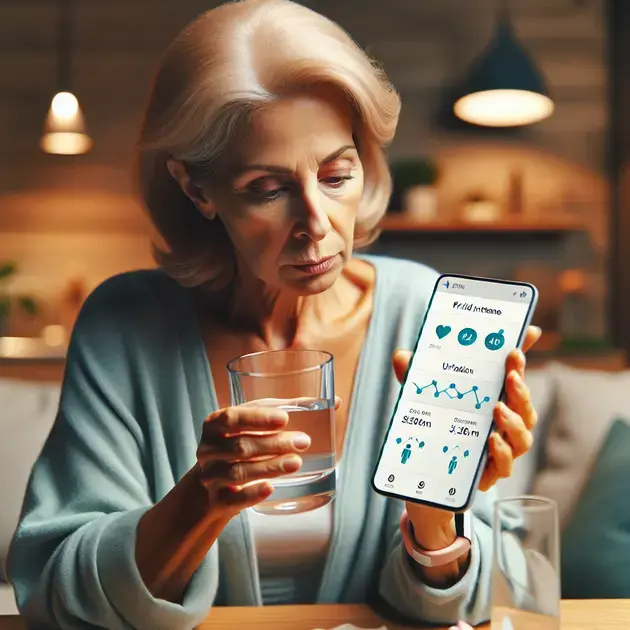Do you find yourself often feeling like you always have to pee? This sensation can be uncomfortable and disruptive to your daily life. In this blog post, we will explore the reasons behind this urge and provide insights on how to better understand and manage it.
Recent studies have shown that the constant feeling of needing to urinate could be a result of certain medical conditions such as urinary tract infections or overactive bladder. By gaining a deeper understanding of the underlying causes, you can take proactive steps towards improving your quality of life and reducing the frequency of this sensation.

Understanding the Urge: A Closer Look at the Sensation
Understanding the sensation of always needing to urinate is crucial in order to address the issue effectively. This constant urge can be caused by various factors, including medical conditions, dietary habits, and lifestyle choices. One way to gain a closer look at this sensation is to keep a diary of your urination frequency, fluid intake, and any associated symptoms. Apps like “Bladder Diary” or “Pee & See” can help you track these details easily, providing valuable insights into your urination patterns.
Furthermore, it’s important to consider any potential triggers that may be exacerbating the sensation. Stress, caffeine, alcohol, and certain medications can all contribute to an increased urge to urinate. By identifying these triggers and making necessary adjustments, you can better manage the sensation of always needing to pee.
Consulting with a healthcare provider is also essential for a deeper understanding of the urge to urinate. They can perform diagnostic tests, such as a urinalysis or ultrasound, to identify any underlying medical conditions that may be causing the frequent urge. Additionally, they can provide personalized recommendations and treatment options based on your individual needs.
Overall, taking a comprehensive look at the sensation of always needing to urinate involves self-monitoring, identifying triggers, and seeking professional medical advice. By gaining a better understanding of the factors contributing to this urge, you can take proactive steps towards managing it effectively.
Common Causes of Feeling Like You Always Have to Pee
Several common causes can lead to the sensation of always needing to pee. One prevalent factor is an overactive bladder, which can result in frequent and sudden urges to urinate. To address this issue, pelvic floor exercises, such as Kegels, can help strengthen the muscles that control urination. Apps like “Kegel Trainer” provide guided exercises and progress tracking to support bladder health.
Another common cause is urinary tract infections (UTIs), which can irritate the bladder and cause a constant urge to pee. Drinking plenty of water and using apps like “Drinking Water Reminder” to stay hydrated can help flush out bacteria and prevent UTIs. In cases of recurring UTIs, consulting a healthcare provider for personalized treatment is crucial.
Certain foods and beverages, such as spicy foods, artificial sweeteners, and citrus fruits, can also irritate the bladder and lead to the constant urge to urinate. Keeping a food diary and using apps like “MyFitnessPal” to track your diet can help identify and eliminate potential triggers. Making dietary adjustments based on your findings can significantly reduce the frequency of the urge to pee.
By understanding the common causes of feeling like you always have to pee and taking proactive measures to address them, you can effectively manage this sensation and improve your bladder health in the long run.
Tips for Managing the Constant Urge to Urinate
Managing the constant urge to urinate requires a combination of lifestyle modifications and behavioral changes. One effective tip is to practice bladder training, which involves gradually increasing the time between bathroom visits to improve bladder control. Apps like “Bathroom Map” can help you plan and track your bathroom schedule, making it easier to adhere to your training routine.
Incorporating relaxation techniques, such as deep breathing exercises or mindfulness meditation, can also help reduce stress and anxiety that may exacerbate the urge to pee. Apps like “Calm” or “Headspace” offer guided meditation sessions and stress-relieving tools to support your mental well-being.
Maintaining a healthy weight through diet and exercise is another essential tip for managing the constant urge to urinate. Excess weight can put pressure on the bladder, leading to increased urinary frequency. Utilizing fitness apps like “MyFitnessPal” or “Fitbit” can help you set goals, track your progress, and stay motivated on your weight management journey.
Lastly, staying hydrated with water and avoiding bladder irritants like caffeine and alcohol can help maintain bladder health and reduce the urge to urinate. By implementing these tips and incorporating them into your daily routine, you can effectively manage the constant urge to pee and improve your overall quality of life.

Distinguishing Between the Urge to Pee and the Need to Pee
Understanding the difference between the urge to pee and the actual need to pee is essential for maintaining proper bladder health. The urge to pee is often a mild sensation that signals your brain that your bladder is starting to fill up. It may not always require immediate attention and can be managed by practicing pelvic floor exercises or delaying the trip to the bathroom for a few minutes.
On the other hand, the need to pee is a more urgent sensation that indicates your bladder is full and needs to be emptied soon. Ignoring the need to pee can lead to discomfort, potential bladder infections, and urinary incontinence. It’s crucial to listen to your body’s signals and respond accordingly to avoid any complications.
To distinguish between the urge to pee and the need to pee, pay attention to the intensity of the sensation, the frequency of bathroom trips, and any associated discomfort. By being mindful of these factors, you can better manage your bladder function and promote overall urinary health.
The Psychological Impact of Feeling Like You Always Have to Urinate
Constantly feeling like you have to urinate can have a significant psychological impact on your daily life. The persistent urge to pee can cause anxiety, stress, and embarrassment, affecting your social interactions and overall well-being. It may lead to feelings of isolation and frustration, impacting your quality of life.
Individuals dealing with the constant urge to pee may experience disruptions in their sleep patterns, leading to fatigue and mood disturbances. This can further exacerbate the psychological toll of the condition, making it challenging to focus on daily tasks and enjoy activities without worry.
Seeking support from healthcare professionals and practicing relaxation techniques such as deep breathing exercises or mindfulness meditation can help alleviate the psychological burden of feeling like you always have to urinate. By addressing the emotional aspect of the condition, you can better cope with its effects and improve your overall mental health.
Nutritional Strategies to Alleviate the Constant Urge to Pee
Optimizing your nutrition can play a crucial role in alleviating the constant urge to pee and promoting bladder health. Including foods rich in antioxidants, vitamins, and minerals can support urinary function and reduce inflammation in the bladder. Berries, leafy greens, and nuts are excellent choices for incorporating into your diet to support urinary health.
Hydration is key in managing the constant urge to pee, but it’s essential to balance your fluid intake throughout the day. Avoiding excessive consumption of caffeine and alcohol, which can irritate the bladder, and opting for water-rich fruits and vegetables can help maintain proper hydration levels without overstimulating the urge to pee.
Incorporating probiotic-rich foods like yogurt and kefir can also benefit bladder health by promoting a healthy balance of gut bacteria. This can help reduce the risk of urinary tract infections and support overall urinary function. Additionally, practicing mindful eating habits and staying hydrated can contribute to reducing the constant urge to pee and improving your quality of life.
Conclusion
In conclusion, understanding the difference between the urge to pee and the need to pee is crucial for maintaining bladder health. By distinguishing between these sensations based on intensity, frequency of bathroom trips, and associated discomfort, individuals can effectively manage their bladder function and promote overall urinary health. Responding promptly to the need to pee can prevent discomfort, bladder infections, and urinary incontinence, highlighting the importance of listening to the body’s signals.
Furthermore, the psychological impact of constantly feeling the need to urinate can significantly affect daily life, leading to anxiety, stress, and disruptions in sleep patterns. Seeking support from healthcare professionals and practicing relaxation techniques are valuable strategies to alleviate the emotional burden associated with this condition, enhancing mental well-being and quality of life. Addressing the emotional aspect is key to coping with the effects of a persistent urge to pee.
Additionally, adopting nutritional strategies such as incorporating antioxidant-rich foods, balancing fluid intake, and including probiotic-rich options in the diet can alleviate the constant urge to pee and promote bladder health. By maintaining proper hydration levels and avoiding bladder-irritating substances like caffeine and alcohol, individuals can support urinary function and reduce the risk of urinary tract infections. Practicing mindful eating habits and staying hydrated are essential steps towards reducing the constant urge to pee and enhancing overall quality of life.
